#collectivism of farms
Explore tagged Tumblr posts
Text

Satantango, a novel by László Krasznahorkai, 1985.
#novel#fiction#literary fiction#literature#Hungarian fiction#Hungarian literature#Hungarian novel#Hungarian author#Hungarian writer#Hungarian novelist#László Krasznahorkai#Satantango#abandoned farms#collectivism of farms#refugee property#swindlers#swindling#2015 Man Booker International Prize
6 notes
·
View notes
Text
We vote 'For!' (the collective farm)
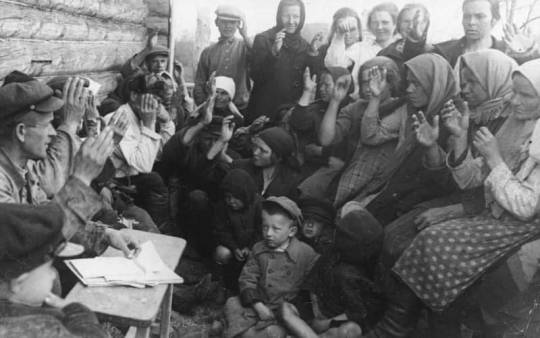
1920s, USSR.
#1920s#soviet union#historical photos#democracy#peasants#Farm#collectivization#socialism#marxism leninism#ussr#marxism#participatory
52 notes
·
View notes
Text
1957: Part X 'Rightists' Criticize Agricultural Collectivization, Industrial and Commercial Policy
Collectivization of Chinese agriculture and the transformation of commerce and industry during the first years of the PRC are the subject of ‘rightist’ critiques in Part X of a full translation of statements and talk excerpts collection at Renmin University during the Hundred Flowers Campaign during which people were encouraged to present their frank criticisms. Selected Rightist Speeches from…
#1957#agriculture#Anti-Rightist#China#collectivization#commerce#commune#Communist Party#cooperative#democracy#farm#history#industry#Mao Zedong#movement#peasant#people&039;s commune#politics#PRC#purge#Renmin University#rightist#Stalin#student#Tan Tianrong#unified procurement and sales system#右派#中国#人民大学
0 notes
Text




Life in a Jewish kolkhoz (collective farm) in Stalindorf, southeastern Ukraine, 1930
Between the world wars hundreds of new Jewish agricultural colonies in the Ukrainian SSR came into being, alongside reconstituted pre-Soviet colonies from the 19th century. Autonomous districts in Crimea and the plains of southern Ukraine administered daily life for Jewish farmers and for their non-Jewish neighbors, with Yiddish as a recognized official language and Yiddish-speaking governmental institutions. From 1923-1941, approximately 200,000 Jews resettled from devastated post-Civil-War towns in the former Pale of Settlement to these farming colonies and thereby restarted their lives. In the 1930s, forced Soviet agricultural policy of “Total Collectivization” and the orchestrated famine in Ukraine struck the communities, as well as Stalin's restrictions on Jewish languages and religious life. It all eventually came to an end with the German invasion of 1941.
226 notes
·
View notes
Text

in the USA the ‘State Farm’ isn’t collectivized agriculture at all, but rather a private insurance company,
145 notes
·
View notes
Note
You quit your job a Joja Corporation to move back to Pelican Valley. Your grandfather has died and you are next in line for succession. You must end farm collectivization, root out the bolshevik revolutionaries and restore the feudal serfdom.
Tsardew Valley
ngl i'd play this
16 notes
·
View notes
Text
Paradoxes in the Revolutions of 1792 and the Revolt of 1870
Warning: There are some text elements in the treatment of Algerian deportees in New Caledonia that are shocking. So refrain from reading if you are not ready.
Do you share my impression of certain aspects of the different revolutions or uprisings in France? I mean, the French Revolution, at its most left-leaning during the government of Year II, was very conservative regarding property rights. Regarding property rights, the entire political class was very timid, even the far left like the Enragés and the Hébertists, who were more focused on economic issues like taxation. However, some, like Momoro, apparently began to consider land redistribution, such as sharing large farms, but without a clear plan (and far from any notion of collectivization of agriculture). There was a concession made by the Convention on property rights with the Ventôse Laws, perhaps? And it is true that on certain economic issues, there were conservative elements, even though during the journée of September 5, 1793, the sans-culottes managed to extract the maximum.
Even Gracchus Babeuf, who seems to advocate for collective exploitation, primarily talks about agriculture. I'm not saying there weren't progressive aspects. There were, like the introduction of universal suffrage, for example, and many other aspects, such as the fact that deputies like Louis Michel le Peletier defended the project to implement free, mixed, secular, and compulsory education, supported by several deputies, including Robespierre (it's sad that this was only adopted years later by a man who, opportunistically, in my opinion, lacked the integrity of Le Peletier, who seems to have been opposed to most of the revolutionaries of 1793-1794 and who unjustly reaped all the credit for this project—I’m talking about Jules Ferry, sorry to the fans of this character). But it must be acknowledged that there were also conservative aspects.
Paradoxically, the Convention proved to be extremely progressive compared to so many others regarding the colonies. The abbé Raynal, so conservative on property rights, apparently called Toussaint Louverture the "Black Spartacus." Sonthonax, considered a Brissotin and advocate of gradual abolition of slavery, did not hesitate to oppose the colonists and slaveholders (just like the Convention) by granting full citizenship to the revolting slaves of 1791 barely a year later. There was the dissolution of the colonial assembly, and important and well-known revolutionaries enthusiastically supported the revolts of the colonized, even their independence, like Deputy Marat or the prosecutor of the Commune, Chaumette, among many others. Black deputies were elected, such as Jean-Baptiste Belley. Some Black people managed to attain high ranks. The overly hostile colonists could be expelled, and there was the dismissal of Governor Philippe Blanchelande, who had distinguished himself by his fierce repression of the slave revolt. During his execution in 1793, Rosalie Julien, one of the important women of the revolution, wrote, "He made the blood of Blacks and patriots flow in streams." It is important to note that she equated the attack on Blacks with that on people considered patriots, a more common position at that time than one might think. I know we must be careful about anachronisms, but I feel that aside from a distrust of foreigners (though this did not prevent people like Fleuriot Lescot or Claude François Lazowski, who came from a Polish family, from holding important positions), the French political class was less racist in 1794 than in 1870 or during the mid-20th century, especially concerning the colonies and overseas territories. There was a regrettable step backward (honestly, can you imagine the Convention of Year II, or the Jacobin or Cordelier Clubs tolerating even the idea of a horrible human zoo as we saw in 1906? I can't). Of course, there were people who supported slavery at that time, like Cloots (a very questionable and paradoxical figure of the revolution, considered close to the Hébertists, yet a very wealthy and conservative man regarding property rights, who had pro-slavery thoughts and was a fervent supporter of colonization because his family and he profited from it, even though he supposedly wanted the Revolution to extend beyond borders according to his own words; according to historian Antoine Resche, he called himself the orator of the human race—very complicated as a revolutionary).
For those who think of the left envisioned by Karl Marx, we're still far from it. Here's an excerpt from The Holy Family: "The revolutionary movement that began in 1789 with the social circle, which, in the midst of its course, had as its main representatives Leclerc and Roux and eventually succumbed temporarily with Babeuf's conspiracy, had sown the seeds of the communist idea, which Babeuf's friend, Buonarroti, reintroduced in France after the revolution of 1830. This idea, developed consistently, is the idea of the new state of the world." Moreover, I have encountered communists who heavily criticize the revolutionaries, except for some ultra-revolutionary members (a few have even added Marat to the list of characters they appreciate, though they know he was not an ultra-revolutionary) by explaining that, in their view, the second revolution from 1792 until the fall of the last Montagnards like Charles Gilbert Romme remained bourgeois, though less so than the one of 1789.

Abbé Raynal
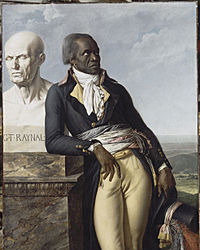
Jean Baptiste Belley
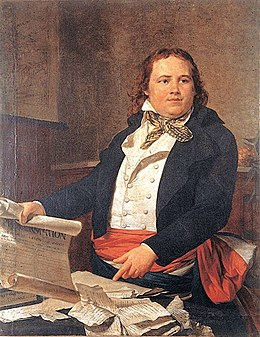
Léger-Félicité Sonthonax

Pierre-Gaspard Chaumette
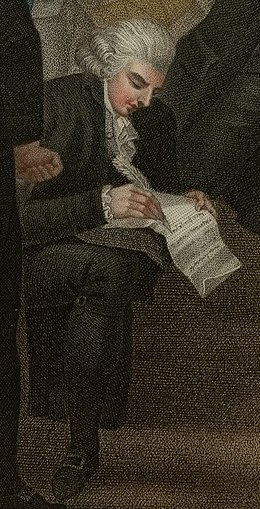
Jacques Roux
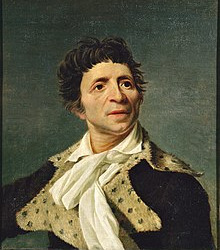
Jean Paul Marat
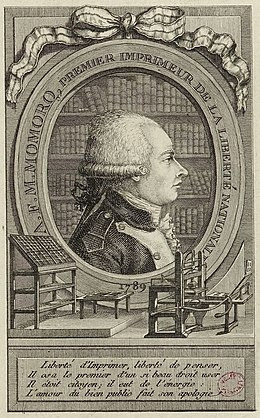
Antoine-François Momoro
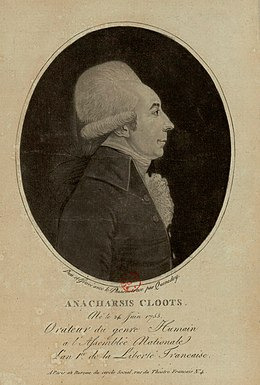
Anacharsis Cloots
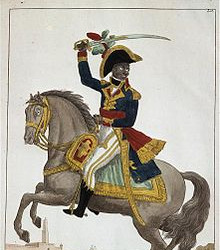
Toussaint Louverture
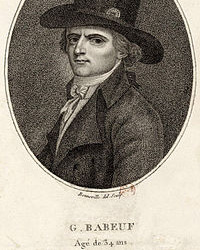
Gracchus Babeuf

Jean-Baptiste Edmond Fleuriot-Lescot

Rosalie Jullien
On the other hand, we have the Paris Commune uprising of 1870, which ended in horrific repression (some estimate that 10,000 people died within a week in the city of Paris).
The origins of this Paris Commune are quite complex to explain, involving the fall of Napoleon III's dictatorship, Bazaine's lamentable behavior, the fact that the new regime forming a republic was composed of monarchists while Paris was predominantly republican, the new regime's abolition of wages, which was one of the only sources of income for workers, and so on.
These Paris communards represented various leftist movements, including the Blanquists, named after Auguste Blanqui (a small anecdote: the composer of "The Internationale" was a communard named Eugène Pottier), anarchists, Proudhonians, as well as centralists like Delescluze (some might even call them Jacobins, though I am not well-informed about that), and even collectivists. The Paris Commune marked a significant shift to the left (albeit briefly). I will mention four measures passed by this government: the abolition of night work (at least for bakers), the separation of Church and State, free, secular, and compulsory education, and the elimination of distinctions between legitimate and illegitimate children.
The repression was atrocious, with death sentences raining down (one of the key figures in the repression, alongside Thiers, was Jules Ferry), and deportations to New Caledonia as well.
It is here that the communards (or at least a significant number of them) were less progressive on certain issues than the main actors of the Convention of Year II. Except for individuals like Louise Michel or Charles Malato, the son of deported communards who followed them to Nouméa, most of the communards did not support the Kanaks at all. There was a lingering racist attitude towards these colonized people, who were also fighting against the injustices imposed on them by the French government. Some even participated in the repression against the Kanaks following the Great Kanak Revolt of 1878, whose main leaders were Atai, chief of Komalé, and Cavio, chief of Nékpi, among others.
I have the impression that the communards behaved similarly toward the deported Algerians. Indeed, in 1869, a significant new insurrection broke out in Algeria, spreading from Kabylie, the Aurès, and towards Algiers, and other territories (the war against France began in 1830, with the defeat of Emir Abdelkader in 1847, the division of three departments in 1848, and the continued Algerian resistance against the establishment of the French colony, notably led by Lalla Fatma N’Soumer and Cherif Boubaghla, though Fatma N'Soumer was captured by the French army in 1857 and died in captivity in 1863 at the age of 33, and Cherif Boubaghla died in combat in 1854; other uprisings lasted until 1870, and one of the most significant was that named Mokrani revolt ).
The insurrection was defeated after fierce fighting, with death sentences raining down, the expulsion of tribes, the sequestration of property, and deportations as well, with around 60 deportees dying from the conditions of deportation. Louise Michel described their arrival in these terms: "We saw them arrive in their great white burnouses, the Arabs deported for having also risen up against oppression. These Orientals, imprisoned far from their tents and flocks, were simple and just, and could not understand the way they had been treated."
They had even fewer privileges than the deported communards. According to some sources, they were chained with red-hot irons, subjected to more intense forced labor, and had to eat soup from the shoes of the jailers. They were forcibly separated from their wives, leading some to marry Kanaks, while others married communard women. It is true that some communards, like Louise Michel and Jean Allemane, campaigned for their amnesty. There were escapes by Algerians, some of whom were recaptured. One of the most famous was Azziz El Haddad, who died in the home of his friend the communard and former deportee Eugène Mourot on August 22, 1895, in Paris. Mourot was also opposed to the colonization of Algeria. A collection by the communards against colonization ensured that his body was repatriated to Algeria.
However, while some deported communards supported them, it should not be forgotten that other communards were driven by colonialist mindsets. It is also interesting to learn more about the Commune of Algiers, proclaimed by Alexandre Lambert, among others. Some European insurgents supported a fraternal republic, but one that excluded Algerian insurgents. Alexandre Lambert, who was killed during the Bloody Week, published a newspaper called Le Colon. The title is quite telling.
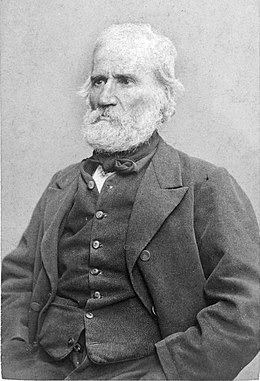
Auguste Blanqui
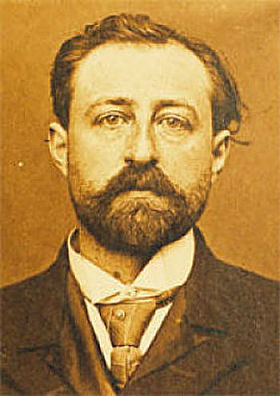
Charles Malato
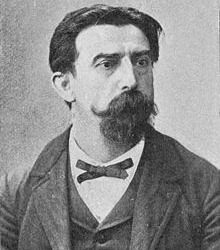
Jean Allemane
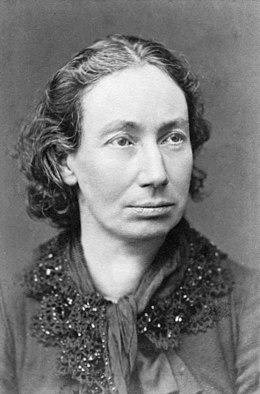
Louise Michel
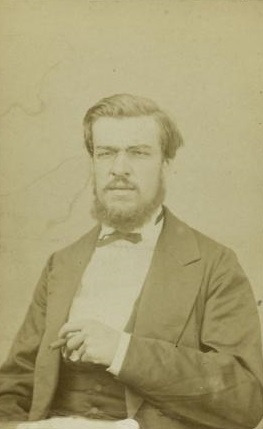
Eugène Mourot
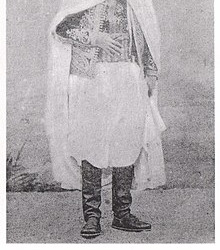
Bou-Mezrag El-Mokrani, brother of Mohamed El-Mokrani
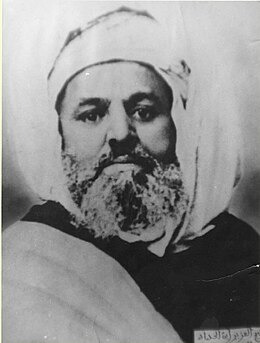
Cheikh El Haddad father of Aziz el Haddad and Cheikh M'hand
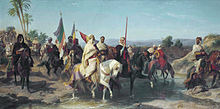
Chérif Boubaghla and Lalla Fatma N'Soumer (Henri Félix Emmanuel Philippoteaux, 1866) alleged portraits
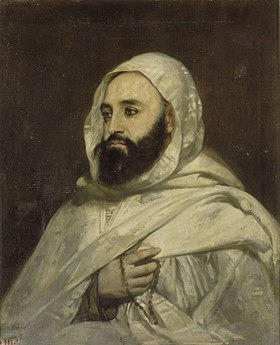
Émir Abdelkader
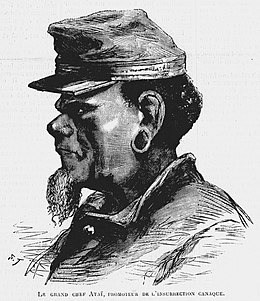
Ataï
And so, this is the paradox of these two French "revolutionary groups" from 1792-1794, and the group of the Communards from 1870. The first group, still very timid on certain social rights such as property rights (even within the extreme left), was nevertheless much more committed to advocating for more rights among men of different colors, with some even going further by supporting the ideas of revolts by the colonized. Moreover, the colonizers were much less listened to after a certain point in time.
In contrast, during the Paris Commune, while there were more progressive ideas and people who were less conservative about property rights (after all, there was representation from collectivists), they were much less engaged in supporting the colonized and at times even approved of colonial repressions.
Sources: Jean Marc Schiappa Alain Decaux Antoine Resche Mehdi Lallaoui - Kabyles du Pacifique
P.S.: I'm not trying to hand out praise or criticism regarding property rights. I'm merely attempting to make an observation. In fact, I might even be wrong on certain points, so I invite you to correct me. And I don't intend to bash the Paris Communards, many of whom suffered or gave their lives for an ideal Republic, and whose horrific repression we don't often discuss. But it's important to acknowledge everything, including their mistakes. Perhaps one day I should address the question of the French left as a whole, from 1789 to 1962, concerning colonization.
#frev#french revolution#france#commune#Paris Commune#1700s#1800s#algeria#new caledonia#colonization#Kanaks#marat#louise michel#Blanqui#babeuf#sonthonax#toussaint louverture#third republic
23 notes
·
View notes
Text
I mention that more British rivers are polluted by farms than by sewage. “You can’t compare farming with water companies,” she says. Would she really defend the chicken sheds whose waste is harming the River Wye? “Poultry here is probably some of the best broiler meat production anywhere in the world. Yeah, there’s a phosphate issue, so we need to be able to strip that out.” During her presidency, the NFU lobbied against stricter rules on manure and fertiliser flowing into rivers, calling the move “irrational”. Batters fairly argues that farmers must be compensated for the green transition. She also wants a return to some fixed subsidies to compensate farmers for the effects of climate change. “Whichever party says, ‘We know that you’re going to be dealing with drought, flooding events and extreme weather — and we’re going to have a land payment that deals with stability,’ farmers are going to say, ‘You’ve got my vote.’” She supports Sunak’s move, in the name of food security, to restrict solar farms on productive land (“really heartening”); she is also turning over part of her farm to growing flowers.
Collectivize this woman's farm immediately, or maybe give it to some unholy massive agricultural conglomerate, whatever it takes she must be stopped.
27 notes
·
View notes
Text
It is estimated that up to 90% of the Nenet population was wiped out during the 1950s in the Soviet Union. The Nenets, who are an indigenous people in Siberia, were targeted by Stalin's government for their traditional way of life as reindeer herders and their resistance to collectivization.
Many Nenets were forcibly moved into collective farms and their reindeer herds were taken away from them. This led to a loss of their main source of food and livelihood, and many died from starvation or disease.
In addition to this, there were also forced resettlements and deportations that further decimated the Nenet population. The harsh living conditions in these new areas often led to a high mortality rate.
Overall, it is difficult to determine an exact percentage of how many Nenets perished during this time period as accurate records were not kept. However, it is widely accepted that the impact on their population was significant and devastating.
#indigenous#culture#indigenous russian#indigenous russia#important#russia#fypシ#fypage#colonization#landback#nenet people#nenets culture#nenets#nenet#indigenous rights#indigenous people#siberian indigenous#siberia#indigenous siberian#siberian#important post#important read
199 notes
·
View notes
Text
reading about the collectivization of farms (+ associated mishandling of food) in the soviet union has made me much more sympathetic to fears of absolute government overreach when it comes to private sector industry; the idea the government could come in, completely overhaul, and then fuck up the very basic machinery of what makes your society function is very scary!
19 notes
·
View notes
Text
To an unbelieving world Stalin announced in early 1933 that the former backward peasant Russia had become the world’s second industrial country. The number of workers employed in industry had doubled from eleven to twenty-two million; the volume of industrial output had also doubled. An iron and steel industry of large proportions had been created. Tractors, automobiles, harvester combines, and every variety of modem machine was being produced. They were being produced inefficiently and with tremendous wastage, which caused loud groans from all the American engineer consultants.
“We wasted and broke machines,” admitted Stalin. “But we gained what is more important – time!”
In the same brief period some twenty million tiny, uneconomic subsistence farms were combined into 200,000 large farms (by 1940 it was 240,000) based on machine power, division of labor and scientific methods. At first they were even less efficiently run than the industries for they operated under locally elected management, chosen by the farmers who had pooled their lands. For two years farming was dislocated, not, as often claimed, by Moscow’s enforcement of collectivization but by the fact that local people, eager to be first at the promised tractors, organized collective farms three times as fast as the plan called for, setting up large scale farming without machines and even without book-keepers. In 1932-33 the whole land went hungry; all food everywhere was rigidly rationed. (It has been often called a famine which killed millions of people, but I visited the hungriest parts of the country and while I found wide-spread suffering, I did not find, either in individual villages or in the total Soviet census, evidence of the serious depopulation which famine implies.) The government met the emergency by drawing on the better trained personnel of industry and sent to the rural districts several thousand of the country’s best organizers – factory managers, army officers, agricultural experts – to help organize the farms. The result was at once apparent in the good harvest of 1933. After this, farming rapidly and permanently improved.
The Soviets Expected It (1941), Anna Louise Strong
13 notes
·
View notes
Text
To understand Ukraine better, think about Ireland
What analogy would help American Catholics understand the situation in Ukraine?
Perhaps we should think about Ireland.
Like Ukraine, Ireland was dominated for more than 200 years by a huge imperial neighbor. Britain in Ireland. Russia in Ukraine. Both nations disappeared from political maps for more than two centuries.
Ireland got its independence from Britain in 1921 after 230 years of domination. Ukraine was finally free of Russian (Soviet) domination in 1991, after more than nearly 300 years of domination. Ukraine had the added problem of more than one colonial ruler, with Poland and Lithuania and Austria in the west, the Ottoman Turks in the south, and the Russians in the east.
Ukraine is a huge country, with relatively level topography, in the middle of Europe. It has been overrun with invaders since the Mongols invaded in the 13th century from the east. Poland and Lithuania dominated Ukraine in the west. In 1686, the Treaty of Eternal Peace between the Polish/Lithuanian confederation and tsarist Russia divided Ukraine in two, with everything east of the Dnieper River and Kyiv going to the Russians. So, beginning in the 1690s Russia dominated eastern Ukraine. They did their best to eclipse Ukrainian culture and referred condescendingly to Ukrainians and "Little Russians." Even the name "Ukraine" is from the Russian perspective. It means "borderland" — and the border is from Moscow's perspective.
Language is an important part of identity. The indigenous languages of Ireland and Ukraine were both suppressed and supplanted by their colonial rulers. Ireland's educated elite spoke English and were sent to England to study. Ukraine's educated elite spoke the languages of their cultural masters: Polish in the west, Russian in the east. Under the tsars and the Soviets, the elites from Ukraine were sent to Russia to study and were expected to become cultural Russians. Today the Ukrainian language is making a comeback, even in the east. In Ukraine, I've met several Russian-speaking Ukrainians who now refuse to speak the Russian language. And Ukrainian is not a dialect of Russian, any more than Spanish is a dialect of Italian. They are distinct.
Both Irish and Ukrainian cultures were preserved in the rural areas. In the countryside, people spoke their native languages at home, in church and among themselves. But in business and in cities they spoke the language of their colonizers, English and Russian. That seems to have been especially true in Ukraine.
While neither Ireland nor Ukraine governed themselves for more than 200 years, their sons were drafted to fight the wars of their colonizers. The people of both nations generally remained poor, while the agriculture of both nations fed their rulers.
Both nations were visited by unnecessary starvation, despite their rich land and agriculture. Ireland had the Great Hunger of the 19th century, brought on by the potato blight and land rents. It killed a million people and sent another million into exile.
In Ukraine, the breadbasket of Europe, at least 4 million Ukrainians starved to death in the 1930s under Joseph Stalin during the Holodomor ("death by hunger"). It was totally unnecessary, brought on by Stalin's policy of "collectivization" of farming and persecution of Ukraine's Culak farmers, who were perceived as anti-Bolshevik. Russian police entered Ukrainian homes and literally took the food from families.
Eastern Ukraine was severely depopulated by starvation, war and political purges by the end of World War II. Russian speakers were brought in to repopulate eastern Ukraine. (That's similar to what the English did in Northern Ireland when they brought in Scots.) This "Russification" changed the ethnic makeup of eastern Ukraine.
World War II was especially cruel in Ukraine. Between 7 and 8 million Ukrainians died in the war; at least 5 million were civilians. The population of the Ukrainian Soviet Republic was 41 million in 1940 and 36 million people in 1950.
Millions of people have emigrated from both Ireland and Ukraine. After World War II, many Ukrainians came to the U.S. and Canada. The Ukrainian Catholic churches that dot our landscape today are testament to their presence here. A new exodus took place from Ukraine in 2022, when about 6 million people left the country as refugees in just a few months. They settled mostly in western Europe. The population of Ukraine had been 41 million before Russia's full-scale invasion began Feb. 25, 2022. Now it is estimated at about 36 million. (No one is sure because a census is impossible to do in wartime.)
Both Ireland and Ukraine have seen severe religious persecution. In Ireland, the British crown banned Roman Catholicism under Irish penal laws. In Ukraine, under the Soviets, all religion — except Orthodox Christianity under the Moscow patriarch — was banned. The state was officially atheist during the Soviet era, 1921 to 1991. Today, as a result of Russia's invasion, the number of followers of the Ukrainian Orthodox Church of the Moscow Patriarchate is declining and the independent Orthodox Church of Ukraine is growing. Whole parishes are leaving the Moscow patriarch. A July 2022 survey by the Kyiv International Institute of Sociology found only 1 of 25 of Ukrainians (4%) identified with Moscow Patriarchate, a considerable drop from nearly 1 of 5 (18%) in June 2021.
Catholics, of both Eastern and Western rites, saw their churches, seminaries, monasteries, convents, schools and universities seized and closed during the Soviet period. Many church leaders had to go into exile. We visited one formerly Latin Rite church in Lviv, built by Polish Jesuits in the 1700s, which had been a book warehouse under the Soviet regime.
The war seems to have promoted the growth and independence of the Ukrainian Orthodox Church. It was recognized as a self-governing (autocephalous) church only in 2018, by the Patriarch of Constantinople (Istanbul). That resulted in the patriarch of Moscow excommunicating the patriarch of Constantinople.
Why is this important for American Catholics? Because I have heard a fair amount of Russian disinformation from American Catholics after our two visits to Ukraine in the last two years.
People ask: Isn't Ukraine really just part of Russia? Answer: No. Not willingly.
Isn't the Ukrainian language just a dialect of Russian? No. It is a distinct Slavic language.
Wasn't Crimea always Russian? No. Catherine the Great seized it from the Ottoman Turks in 1783. Stalin deported most of the local Tatars to concentration camps in the 1930s.
History matters. It helps us to understand the past and deal with the present.
In 1991 Ukrainians took their rightful place among the peoples of the world. It has been a centuries-long struggle to be free of domination by their imperial neighbors. From what I have seen, they are absolutely determined that they will not again disappear from the maps of the world.
#Ukraine#Russia#Ireland#catholicism#America#catholic#holodomor#article#the great hunger#potato famine#russification#Mod note: disappointed they didn't mention the other hypothesis that the name Ukraine means land or country in Ukrainian#But the comparison is interesting and useful at least
8 notes
·
View notes
Text
The Holodomor of 1932-1933.
Grain exports in the 1930s made up 20% of the USSR's foreign exchange earnings. https://ru.m.wikipedia.org/wiki/%D0%97%D0%B5%D1%80%D0%BD%D0%BE%D0%B2%D0%BE%D0%B9_%D1%8D%D0%BA%D1%81%D0%BF%D0%BE%D1%80%D1%82_%D0%A1%D0%A1%D0%A1%D0%A0
In 1930, Ukrainian peasants were deprived of 30% of their harvested grain, 38% was taken in the North Caucasus, and by 1931, nearly half was confiscated. In Kazakhstan, cattle were seized instead of grain. Regions such as the Volga, the Urals, Siberia, and the Central Chernozem area also suffered, though potatoes and onions were sometimes left for the peasants. In 1932, a less fruitful year, quotas were raised by a third. Collective farms that failed to meet quotas saw all grain, including seeds and household food supplies, confiscated. This famine affected areas with populations totaling 30-50 million people. https://www.bbc.com/russian/russia/2013/11/131119_golodomor_anniversary_definition
Under the Tsarist regime, famine-stricken individuals could flee to other regions. Under Stalin, blocking detachments were deployed to prevent peasants from leaving collective farms. Over four years, including the famine period, Stalin exported 13 million tons of grain. Refusing grain exports could have saved 25-30 million lives, but the peasants were scapegoated. https://novayagazeta.ru/articles/2008/06/02/37807-eksport-na-kostyah
The West was aware of the famine in Soviet Ukraine. There were efforts to aid the starving, but the Soviet Union refused assistance. https://www.youtube.com/watch?v=T2eVpQKmwSA
Eyewitness Anna Domanskaya recalled on Deuche Welle: "My aunt brought some flour, diluted it with water, and we drank this water." https://www.youtube.com/watch?v=7nZ7y9xjae8
In a documentary on Suspilne Kultura, Grandma Ksenia recounted: "In '33, the hunger was so severe here that there were people who ate their own children." https://www.youtube.com/watch?v=NupPRCU2taQ
For some villagers, particularly the rural poor, participating in forced collectivization and robberies offered social advancement. Others joined to avoid being targeted themselves. https://www.youtube.com/watch?v=hlZ20lC_1AA
To seize grain, Stalin needed to dismantle private ownership and turn everyone into collective farm laborers from whom the state could take unlimited amounts. 1.5 million people were dispossessed, with 850,000 forcibly resettled. https://www.youtube.com/watch?v=yc-D5CFnwmI
The number of Holodomor victims remains contested, ranging from 3 to 16 million Ukrainians. https://holodomormuseum.org.ua/ru/news/chyslo-zhertv-holodomora-henotsyda-v-ukrayne-pytaiutsia-yskusstvenno-pryumenshyt-uchenye/
The Ukrainian National Book of Remembrance for Holodomor Victims contains 882,510 names and continues to be updated. https://holodomormuseum.org.ua/hololomor/natsionalna-knyha-pam-iati-zhertv-holodomoru-1932-1933/
Millions died in other regions as well. According to the census data in the USSR in 1937, there were 9 million fewer people, compared to 1926. Stalin shot the census takers as public enemies. https://novayagazeta.ru/articles/2008/06/02/37807-eksport-na-kostyah
For decades, the USSR prohibited public remembrance of Holodomor victims. At a 1951 memorial rally in New York, Raphael Lemkin, a Yale University professor and the author of the legal term "genocide," called the USSR’s actions against Ukrainians "a classic example of genocide." https://holodomormuseum.org.ua/ru/den-pamiaty-zhertv-holodomora/
On December 9, 1948, the UN General Assembly adopted the Convention on the Prevention and Punishment of the Crime of Genocide. https://www.un.org/ru/documents/decl_conv/conventions/genocide.shtml
Many countries and international organizations have since recognized the Holodomor as genocide. https://holodomormuseum.org.ua/ru/pryznanye-v-myre-holodomora-aktom-henotsyda/
In Russia, a recent history textbook has removed any portrayal of the Stalinist regime as criminal. https://meduza.io/news/2023/08/21/v-rossiyskom-voenno-is
History repeats itself: evidence from Bucha and Irpin echoes the actions of Soviet authorities.
In 1991, Russia passed the Law on the Rehabilitation of Victims of Political Repression, but efforts to rehabilitate dispossessed victims remain inconsistent. In 2008, the Russian State Duma acknowledged the connection between famine and forced collectivization. However, the majority of those responsible for the crimes of the communist regime have escaped punishment. https://trjustice.ilpp.ru/chapter-6.html
To avoid repeating past mistakes, regime change in Russia must include lustration of Putin’s security services, the opening of Soviet and modern archives, thorough investigations, and public trials of perpetrators. Public awareness campaigns, memorials to victims, and penalties for future attempts at repressive laws are also crucial. Condemning the actions of the Communist Party of the Soviet Union can justify revisiting repressive measures against armed resistance to the communist regime and affirming the right to rebellion.
Proofs and links are in the description. Subscribe and help!
And be sure to help spread the information on the fundraiser that we are making together with Russian anti-war activists from other countries. Activists in Spain found portable power stations officially requested by Ukrainian hospitals and schools at wholesale prices. It's already winter in Ukraine, we need to collect the required 100,000 euros as quickly as possible. https://antiwarcommittee.info/en/energy-for-life/
2 notes
·
View notes
Text
Wip Whenever
I'm HERE!!!! Helloooo Tagged by @mareenavee and @rainpebble3 I am transient on tumblr atm but I'm gonna read the heck out of your posts over lunch. I've been everywhere honestly. This week I finished three fics. One I've published and two that are a bit longer. I also started a new render of a golden retriever. Yes for once this an entirely Erra Ilaba'andul post. Art first!!!!
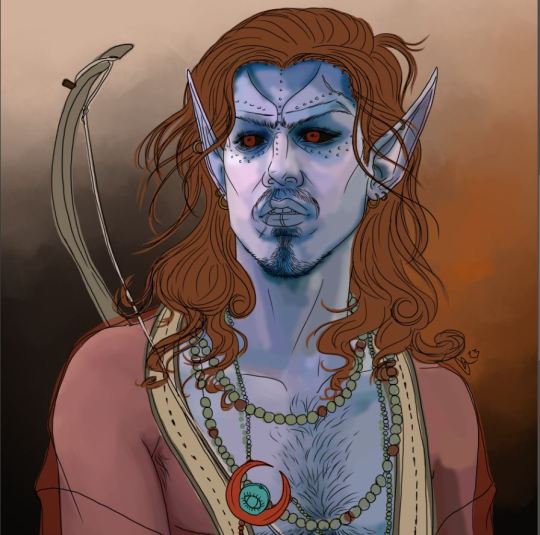
POTATO MODE THAT ELF!
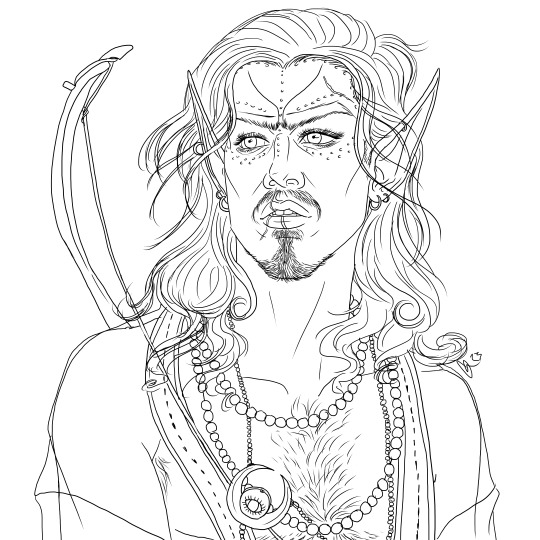
Guy needs a render. If only because I'm obsessed with his eye colour. ;) Now writing. CW, I'm detailing mentions of raiding. Placed under the cut.
He had eventually told Teldryn the whole story about that raid on Tel Vos’s unnamed farming villages. They had been sharing that drink that he had promised, Teldryn finally being well enough to do so when the topic once again came up. He had gifted Erra that bow they had retrieved from the caverns. Sul-Matuul having bestowed it on him as a reward, and a mark of his acceptance into the clan. It was symbolic in this case, all recognised adult clan members had been gifted a weapon after the successful completion of their harrowing. Usually, it was the one they had retrieved from the caverns, though exceptions were made based in some cases. Erra, for example, had traded in the glass claymore he had retrieved for a chitin bow, much like the one he was repairing now. He was terrible with a sword. Too close and too heavy. He preferred the safe distance that a bow allowed him. He had a talent for it, so he was permitted an exchange.
Traditionally, these weapons would be used only once, on a first raid. Though Erra did not expect Teldryn would be taken on one. It was a tradition that the Urshilaku had been practising less and less as their focus shifted from raiding the towns along the frontier for glory and goods to clearing out the various caverns and ruins that dotted the ashwastes of Sixth House cultists and their ghosts.
He had told Teldryn of that last raid he had been on. Of how he had joined the Zainab after being banished for leaving a betrothal that he could not go through with. How he was a key part of their hunting parties. He told him of how the Grazelands to the east had been slowly falling to the sickness radiating from Red Mountain, much as the Ashlands had. That all the clans had become desperate since the first ghosts had spilled out of Kogoruhn thirty years prior. He told Teldryn how, as the game dried up and the crops they foraged for died, they turned increasingly to raids to sustain themselves.
He said that he had justified his actions by telling himself that he was desperate, starving. The guar had become sickly and their shalk herds had died. That they had no other choice. This was not raiding for glory or gold. They were not capturing the people whose homes they had ransacked. That they were not devastating them further.
Because at the time that was what it was. They were not capturing the villagers, they were not burning down towns, and they were not murdering the farmers, who were struggling with the blight just as much as they were. They were not taking the children to sell to the highest bidder and they were not raping the wives and daughters. They were just…it was…
The thought of that raid had always left him feeling sick to his stomach. He had been willingly joining these raids, it was how he had met his previous partner, Ashur-Dan after all. A mer whom he thought he loved, who he thought shared the same views. Ancestors, it was all such a mess!
Teldryn had just sat there, nursing his drink, nodding, no interjection nothing. Well, not until he had mentioned the sudden addition of Erebenisum warriors to their raiding party. He merely raised an eyebrow at the mention of his father’s former clan and nodded as Erra continued. Telling him of how they slowly took control of their party, how it had originally been a collective of mer from Ahemmusa and Zainab. That the Erebenisum had started to join later. That they became the dominant force in this collective, though the more populous Zainab had filled most of their ranks.
It was out of desperation still…was it not?
The nature of their raids had changed with the edition of the Erebenisum warrior party. They lived for the kind of glory only a bloody harvest could provide. Their raid parties were legendary, their ruthlessness infamous across Vvardenfell. The alchemical substances they took right before setting out were responsible for most of their ferociousness. They were legends amongst his fellow warriors, something to strive for. They took control of the war parties, each subsequent raid becoming more and more violent. Erra had started hanging back, not striking when everyone else did, not taking hostages not…
It had all come to a head one day when some of the Zainab warriors had started accusing Erra of being soft. That he was little better than those fat and lazy House Dunmer that they tormented. It was becoming impossible, and people were beginning to talk. Not just of Erra’s unwillingness to ‘do what needed to be done’ but of other things as well. Of Erra’s true reason for joining the Zainab, that he wasn’t simply looking for greener pastures but had been unofficially banished. That his friendship with Ashur-Dan was more of a…
Erra did not want to lose the life he had built amongst the Zainab. Or at least that was what he told himself. He had chosen to join that raid. He had lit those huts on fire in a rain of fired arrows. He took the lead. Erra told Teldryn that he had acted exactly as expected until he could no longer.
He had entered that hut with some of the warriors from Erabenimsun and Zainab, Ashur-dan by his side as always, jeering him on, joining the rest in their taunts and accusations. Was there pressure? Yes. Were they all out of their minds on the resin of some sort of rare flower? Yes. But in the end, he had been the one to draw his blade. Even if he had hesitated when he was instructed to slit each of their throats.
So that was what he did. Erra had ignored that old mer’s pleas for mercy as he drew his blade across his throat. That resin he had smoked alongside the rest of his party had clouded his head completely. He killed almost everyone in that hut, one having escaped in the chaos. He was not sure if he had let the kid go, or if it was just his blood-hazed trance but he just watched that boy leave. And everyone saw it happen.
Erra told Teldryn that this was why he had ultimately turned to a life in the cities. That it had never been his first choice, but there was no longer a place for him amongst any of the tribes. Letting that boy go had been the final nail. He had fled that life completely. The guilt was why he never liked to talk about that part of his life. But Teldryn had somehow soothed it out of him.
He kissed the back of Teldryn’s hand as he finally seemed to settle, the mumbling and fitfulness finally ending. Erra noticed Teldryn was a lot warmer now, there was more colour in his cheeks. It was subtle but it was there. He moved to pull up the blankets that Teldryn had kicked off during his nightmare. He noticed there was a small, crimson spot forming against the crisp white linen of his bandages and it was rapidly growing bigger, darker. It looked like all that thrashing had reopened the wound after all. He would have to go find his aunt. At least he could tell her he had done this himself, asleep as he might have been he still moved. It was progress, even if it was marred by a large setback.
Erra stood, leaving Teldryn as he was, lying fast asleep on that pile of cushions. He placed his half-repaired bow with the rest of his things and headed to the door. He figured he could find himself something to eat after his aunt had given the all-clear. It had been hours since he had eaten anything substantial. He was famished.
“Erra?”
#my art#Erra Ilaba'andul#Mentions of#teldryn sero#danger!josh#Anxious!Erra#wips#dunmer#morrowind#the elder scrolls#tesblr#nerevarine#ashlander#urshilaku#Zainab
18 notes
·
View notes
Text

Interesting idea. However, the endings need work.
In Ending #1, you starve to death during the Civil War because the Red and White armies kept requisitioning all your grain to feed themselves.
In Ending #2, you join the Green armies to fight off the Red and White armies attempting requisitioning of your grain. You then end up massacred in Tambov by the Red Army and a hundred years later, a 20something commie blogger will accuse you of being an ally of imperialists.
In Ending #3, you get deported to Siberia or Central Asia during collectivization and probably starve or die of disease.
In Ending #4, you stay on the collectivized farm and then starve to death anyway because Stalin and the NKVD preferred the iron fist approach.
In Ending #5, you say, "Fuck it", move to a city, and then try get a job in a factory.
I have no idea why in the hell apas-95 think that the Whites were huge fans of the peasantry (indeed, they refused to sanction the peasants' seizing of the land from the gentry and nobility until the very last moment), but then she really has no clue about peasants in general.
For example, no, it is not "basic Marxism" that the peasants were privileged above the proletariat. Marx was aware the feudalism was a shitty and unequal system and that capitalism was in many ways preferable to it, though he recognized that capitalism was still exploitative and unjust.
4 notes
·
View notes
Text
youtube
Socialist Farming in 🇻🇳 Vietnam
How does farming work in Vietnam? I grew up on a collectivized farming coop in Vietnam, so I'm the perfect person to tell you! Find out all about how industrialized farming works in a socialist economy!
2 notes
·
View notes